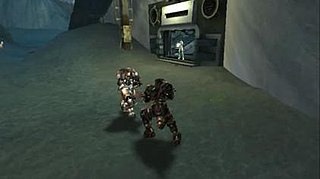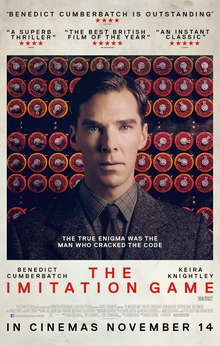
Alan Mathison Turing was an English mathematician, computer scientist, logician, cryptanalyst, philosopher and theoretical biologist. He was highly influential in the development of theoretical computer science, providing a formalisation of the concepts of algorithm and computation with the Turing machine, which can be considered a model of a general-purpose computer. Turing is widely considered to be the father of theoretical computer science.

ELIZA is an early natural language processing computer program developed from 1964 to 1967 at MIT by Joseph Weizenbaum. Created to explore communication between humans and machines, ELIZA simulated conversation by using a pattern matching and substitution methodology that gave users an illusion of understanding on the part of the program, but had no representation that could be considered really understanding what was being said by either party. Whereas the ELIZA program itself was written (originally) in MAD-SLIP, the pattern matching directives that contained most of its language capability were provided in separate "scripts", represented in a lisp-like representation. The most famous script, DOCTOR, simulated a psychotherapist of the Rogerian school, and used rules, dictated in the script, to respond with non-directional questions to user inputs. As such, ELIZA was one of the first chatterbots and one of the first programs capable of attempting the Turing test.
Alan Turing (1912–1954) was a British mathematician, logician, cryptanalyst and computer scientist.
A codebreaker is a person who performs cryptanalysis.
The Imitation Game is a 2014 film based on a biography of Alan Turing.
A professor is a senior teacher, lecturer and researcher, usually in a college or university.

The Turing Test is a BBC Books original novel written by Paul Leonard and based on the long-running British science fiction television series Doctor Who. It features the Eighth Doctor.
Artificial stupidity is a term used within the field of computer science to refer to a technique of "dumbing down" computer programs in order to deliberately introduce errors in their responses.

The computer game bot Turing test is a variant of the Turing test, where a human judge viewing and interacting with a virtual world must distinguish between other humans and video game bots, both interacting with the same virtual world. This variant was first proposed in 2008 by Associate Professor Philip Hingston of Edith Cowan University, and implemented through a tournament called the 2K BotPrize.
Eugene Goostman is a chatbot that some regard as having passed the Turing test, a test of a computer's ability to communicate indistinguishably from a human. Developed in Saint Petersburg in 2001 by a group of three programmers, the Russian-born Vladimir Veselov, Ukrainian-born Eugene Demchenko, and Russian-born Sergey Ulasen, Goostman is portrayed as a 13-year-old Ukrainian boy—characteristics that are intended to induce forgiveness in those with whom it interacts for its grammatical errors and lack of general knowledge.

The Turing test, originally called the imitation game by Alan Turing in 1949, is a test of a machine's ability to exhibit intelligent behaviour equivalent to, or indistinguishable from, that of a human. Turing proposed that a human evaluator would judge natural language conversations between a human and a machine designed to generate human-like responses. The evaluator would be aware that one of the two partners in conversation was a machine, and all participants would be separated from one another. The conversation would be limited to a text-only channel, such as a computer keyboard and screen, so the result would not depend on the machine's ability to render words as speech. If the evaluator could not reliably tell the machine from the human, the machine would be said to have passed the test. The test results would not depend on the machine's ability to give correct answers to questions, only on how closely its answers resembled those a human would give. Since the Turing test is a test of indistinguishability in performance capacity, the verbal version generalizes naturally to all of human performance capacity, verbal as well as nonverbal (robotic).
The Alan Turing Year, 2012, marked the celebration of the life and scientific influence of Alan Turing during the centenary of his birth on 23 June 1912. Turing had an important influence on computing, computer science, artificial intelligence, developmental biology, and the mathematical theory of computability and made important contributions to code-breaking during the Second World War. The Alan Turing Centenary Advisory committee (TCAC) was originally set up by Professor Barry Cooper

The Imitation Game is a 2014 American period biographical thriller film directed by Morten Tyldum and written by Graham Moore, based on the 1983 biography Alan Turing: The Enigma by Andrew Hodges.

Turochamp is a chess program developed by Alan Turing and David Champernowne in 1948. It was created as part of research by the pair into computer science and machine learning. Turochamp is capable of playing an entire chess game against a human player at a low level of play by calculating all potential moves and all potential player moves in response, as well as some further moves it deems considerable. It then assigns point values to each game state, and selects the move resulting in the highest point value.

The GeForce 16 series is a series of graphics processing units (GPUs) developed by Nvidia, based on the Turing microarchitecture, announced in February 2019. The 16 series, commercialized within the same timeframe as the 20 series, aims to cover the entry-level to mid-range market, not addressed by the latter. As a result, the media have mainly compared it to AMD's Radeon RX 500 series of GPUs.

Alan Turing was an English mathematician, computer scientist, logician, cryptanalyst, philosopher, and theoretical biologist. He left an extensive legacy in mathematics, science, society and popular culture.








